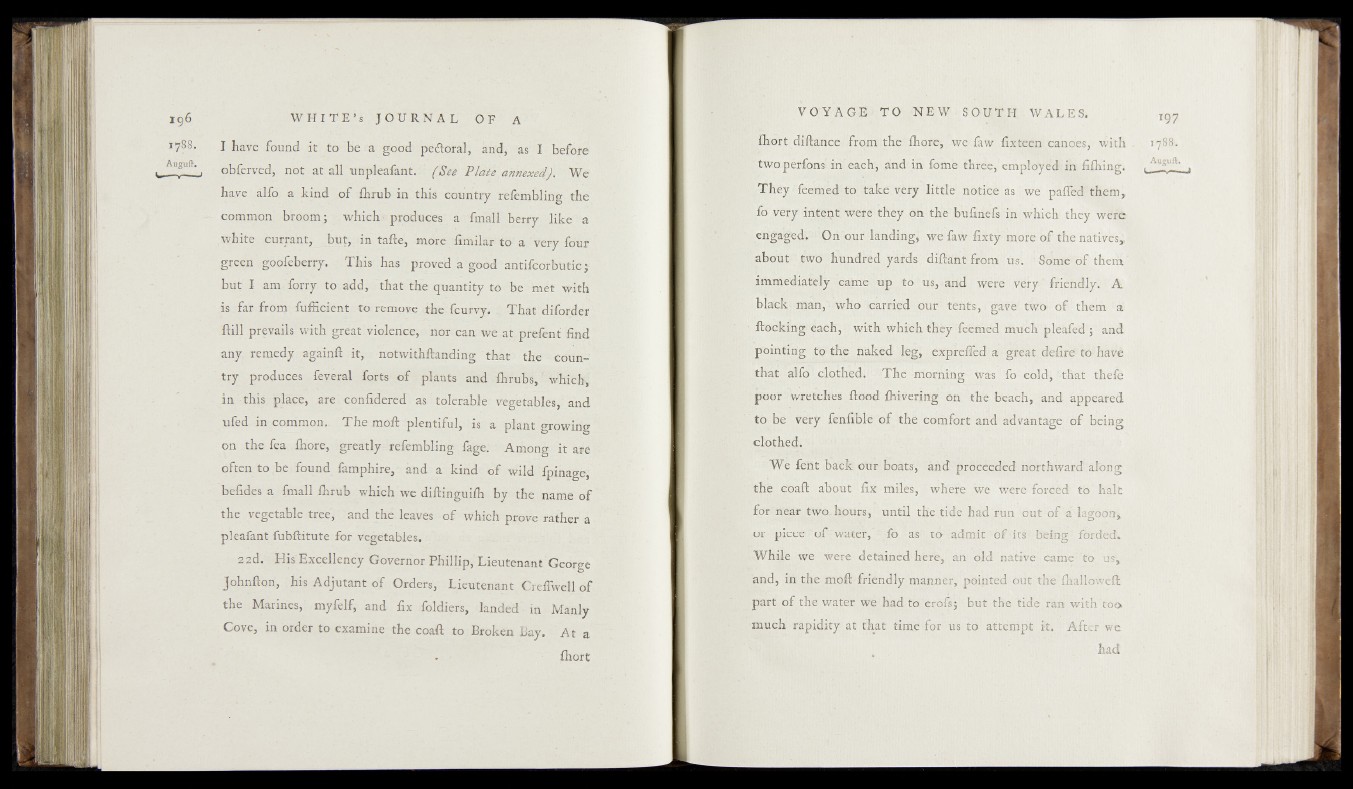
W H I T 'E * J'f J O 'U l S A L O F A
I have found it -ttiSHe-fa good' pe&o'rak and, as I before
efiferved, nohat all unpleafant.-tT^SW Pldte\ahnexe4).- We
haj?e^alfoj a kind of fhrub in this country refembling- the
common' broom^ , whicht produces ' arfmall berry -like' ‘ a
white^currant, . but, in tafle, morefi-milar to a- very fohr
green Vgobfeberry. This' has . proved ,4 good ahti&orbU-tie y-
but I am forty to add, that the quantity to^treWmet with
is .far.sfronj-» Sufficient - to remove Urhel fcurvy. . That diforder
Xtill prevails'wdtM^datlviolence^ nor can-we -at, prefent ifind
any remedy againfl: it, notwicfeftanding than the'scoiin-
.try produces feveral forts of plants
in this, place j aTe/e|nfidered- as'tolerable' vegetables,’ and
ufed in common.. ‘ Themod plentiful; Ts' a plant growing
on the fea Ihore, greatly refembling % e ;> Among’ it are
often to be found famphire," and a kind of wild Tp inage;
belides a fmall fhrub which we diftingui/h. by dhe naraiiof
the .-vegetable ttee/ and the leaves '-of- Which prove rather a
pleafant fubftitute for Vegetables. /
h 22d^>< H is! Excellency Governor Phillip,Tieutenant George
JohnAon, his Adjutant o f Orders, Lieutenant Creffwell of
the .Marines,; myielf, and fix doldiers, landed - in Manly
Cove, in order to examine the coaft to Broken Bay. At a
. - fhort
VO'YAGiE-> TO 'NfiW1 ^S‘OtJTH WALES,
fhort diftance from the fhore, we faw fixteen canoes,- with
{'two.per.fons' iiii eaclpi ^a;ndiiv ftime thrde/ employee^ in.fifhing.
&Th'dy to} 'take very‘fitflfe* notic^.as ' we pafledThem,
fo -very int|bCweie- they tin- the bufinepfib’which they were
engag'ed- On our landing, we faw fixty more of the natives;'
about two hundred yards diftant from us. Some of them
immediately came up to us, arid were very friendly. A
black- man,'- who carried1 our' tbits, t'gave two*- of' them fm
«ffeckln^liaell, with whidh they Teemed much 'pleafed ; and
pointing to the . naked Jeg, exprefied a great defire- to- have
that ailfp vc-lothed.^The' morning “ was fo' eSldj f-that thefe
poor‘Wretches flood fM^eribg-dn 'the bfe^b, and appeared
to-be very fe'nffblti of the comfort and' advantage of being
clothed.'i
f We fent back our boats, and proceeded northward' along
the coaft about fix miles, where we were forced f i halt
for near two, hours, until the tide had run out of a lagoon,
or- piece of water, fo as to admit o f its- being forded.
While we were detained here, an, old native came" to us
and, in the moft friendly manner, pointed out the {hallowed
part of the water we had to crofsj but the tide.; ran with too
much rapidity at that time for us to attempt i-t. After we
had